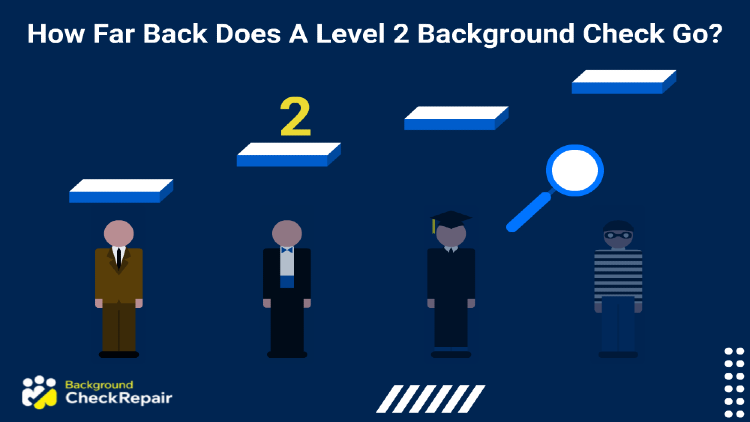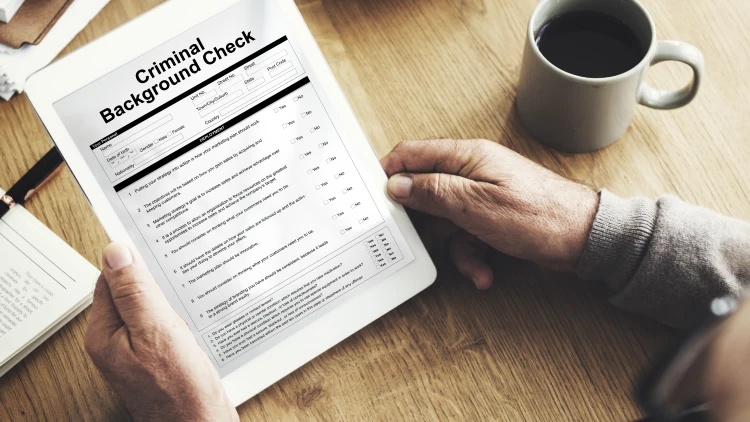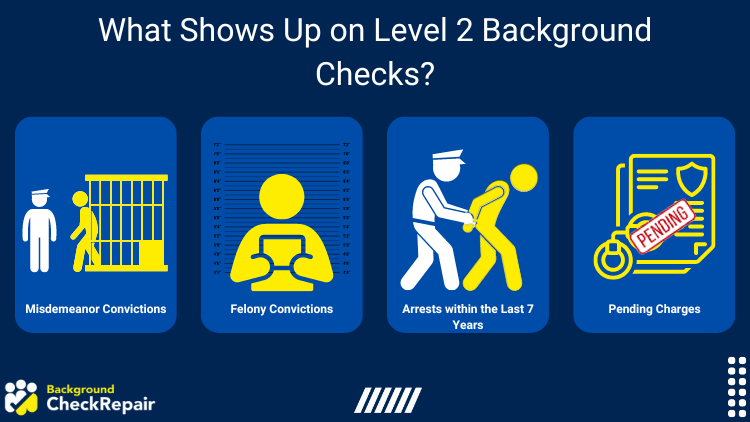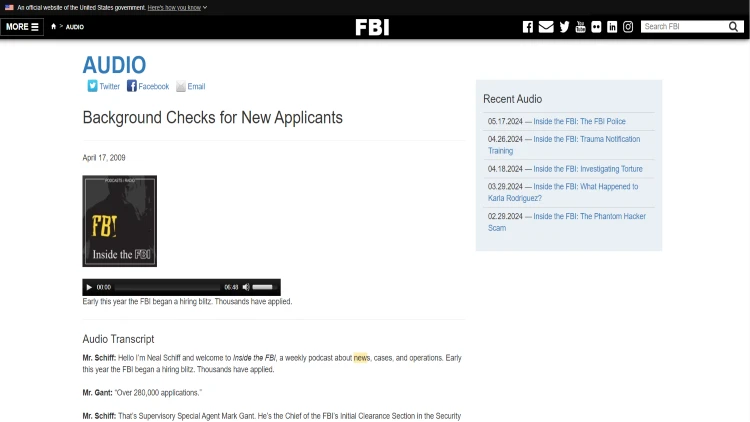We use cookies to ensure that we give you the best experience on our website. If you continue to use this site we will assume that you are happy with it
How Far Back Does a Level 2 Background Check Go? (It Depends)
 Written by Background Check Repair
Written by Background Check Repair
Background Checks | May 29, 2024

Table of Contents
If you’ve ever wondered “how far back does a level 2 background check go,” you may be surprised to know that the answer is slightly complicated. In fact, the answer depends widely on which state the background check is being processed. Florida is currently the only state with an official level 2 background check codified in law, but all other states use this form of history search for a variety of reasons. And, how far back it goes depends on a number of factors.
A level 2 background check typically uses fingerprints to check state and national databases for a criminal history search of people in the process of getting a new job. Only certain positions require a level 2 background check. Typically, jobs that require work around sensitive members of the population will be legally required to complete a background screening.
The different time limits for each state occur because there isn’t a set federal guideline dictating a universal standard. This causes a bit of confusion for those who are in the process of having a level 2 background check completed. Understanding how far back does a level 2 background check go, in your specific state, as well as what information is returned, can help you determine if you need to explore other methods of excluding criminal history from a background investigation.
How Far Back Does a Level 2 Background Check Go? (Understanding Background Checks Nationwide)
When answering the question of how far back does a level 2 background check go, the short answer is that it depends. Different states have different rules about what information can be returned on a level 2 check. Furthermore, different states have different definitions of what a level 2 records check comprises, and how the results can be used in a professional capacity.
In other words, the extent of a criminal history search for a level 2 check will be affected by every state’s laws.
Furthermore, Florida is the only state that has the term “level 2 background check” established in state law. Most other states have fingerprint checks outlined as an equivalent to a level 2 background check. To make things even more confusing, there isn’t a federal law that outlines how far back the check can go. This means that each state has the right to choose its own timeline on how far back do background checks go.
How Many Years Does a Level 2 Background Screening Go Back in Florida? (Florida Background Checks)
There are certain records that will be removed from a background check after seven years in Florida.3 However, this doesn’t mean that everything that is over seven years old won’t be found. For example, if you have a felony criminal charge on your record, that will still be shown no matter how old it gets.

The only way to remove a felony charge is to have it expunged from your record. The process of having a record expunged can be found on most state websites. Keep in mind that not everyone is eligible to have a record expunged.
So what information won’t show up after seven years? If you were arrested but didn’t get charged or convicted, these things can’t be reported after seven years in Florida.
Which Other States Have a Seven Year Limit?
If you’re wondering “how far back does a level 2 background check go,” the answer will be seven years if you live in one of the following states These states have a seven-year limit for some criminal background check history:
- Maryland
- Massachusetts
- California
- Nevada
- Montana
- Texas
- New York
- Washington
- Florida
The states that follow the 7-year rule do so because of the Fair Credit Reporting Act, which states that a background check can’t go back to information beyond seven years, in order to make decisions about employment or housing.4
However, there are exceptions to this rule. Typically, if the salary of the prospective position is greater than $75,000 a year, then the history screening can be increased to ten years (see all states with a 10-year limit). For California records checks, the salary threshold is $125,000.
While this federal law is in place in the states above, the other states don’t necessarily follow it. In fact, the states that aren’t on the list above typically follow a 10-year guideline, which means that arrests that didn’t result in a conviction won’t show if they are more than 10 years old.
It can be very confusing when trying to figure out what will show up on a background check because there aren’t currently any federal laws regarding timelines.
You should also know that not all information found through a background investigation needs to follow the 7 or 10-year rules. Only arrests that didn’t result in a formal conviction are subject to dropping off your record.
A background check goes back indefinitely for any convictions that haven’t been expunged from your record. This means that a misdemeanor or felony charge can show up on your record regardless of the amount of time that has passed.
What Is a Level 2 Background Check?
A level 2 background check is a fingerprint-based background check that returns criminal history information, identity confirmation, and education. The term Level 2 background check comes directly from Florida, which is the only state that legally uses that term.
However, the term is also used for other states and simply refers to an out-of-state background check (also known as a federal background investigation). In contrast, a level 1 check will only show records from a single jurisdiction, county, or state.
In most cases, a level 2 background check is used to check someone’s eligibility for a position that will be required to work around children or elderly individuals.2 This type of background check typically checks criminal history records in both state and national records. When a level 2 background check is run, it is usually looking for a history of criminal activity that relates directly to the job description. A level 2 background check is not the same thing as a credit check and does not report on your credit health.
What Is a FDLE Background Check?
FDLE stands for the Florida Department of Law Enforcement. Based on their website, the FDLE considers an FDLE background check to be the same thing as a criminal history check.
In Florida, they have two different types of criminal history background checks: level 1 and level 2. A level 1 background check is run using someone’s name and checks against state records only. A level 2 background check is run using a name and fingerprints and is intended to check for criminal history information to confirm a potential employee is qualified for a sensitive job.1
The criminal history check is often run against a Florida computerized criminal history database but also searches national records.
Are Criminal Background Checks the Same as a Level 2 Background Check?
In most states, criminal background checks are similar to level 2 background checks. Both are usually run using the person’s fingerprint and name, and both return information about the person’s state and national criminal history. The specific title of a level 2 background check involves the search through a criminal history record as a condition for employment around a sensitive population.
In most cases, a level 2 background check is used as a background screening for an applicant for a job at a hospital or around children (like a public or private school), as well as government positions. But, a criminal background check can be run for any number of reasons by a variety of different people, including police or landlords.
Why Would You Need a Level 2 History Record Check?
Certain jobs require a level 2 background check before offering employment to a candidate. Jobs in hospitals, government agencies, schools, childcare, or other sensitive areas all typically require a level 2 background check. Furthermore, some positions even have requirements based on federal laws like in the case of level 2 background screening for medical professionals.
The reason behind this type of screening is to keep those you would be working around safe. It is also done to prevent potential legal action against the business in the future. If a person has a record that shows a history of violence and is hired on to work in a nursing home or child care facility, there is a potential for legal action to be taken against the employer, should anything happen.
By screening the background before hiring, an employer can also confirm that a potential employee is safe to be around other employees and customers or clients. The information received from the check on your background will likely be reviewed by a panel before a hiring decision is made. All other applicants for the job will be subject to the same pre-screening.
What Information Does a Background Check Include? (Does a Phone Number Come Back on a Records check?)
Level 2 background checks return a variety of different information, including a criminal history record check for both state and national crimes. It should also be noted that the answer to “how far back does a level 2 background check go” will influence the information included in the background check.
 Criminal records on a background check include warrants and convictions. Here’s a full list of what will show up on level 2 background checks:
Criminal records on a background check include warrants and convictions. Here’s a full list of what will show up on level 2 background checks:
- Misdemeanor Convictions
- Felony Convictions
- Arrests within the Last 7 Years (Depending on the State)
- Pending Charges (Depending on the State)
Two items might appear on a level 2 background check depending on the state where it is run. The first item is arrests within the last 7 years. Most states have different rules that dictate how far back a background check report can go regarding previous arrest records.
Moreover, most states will show pending charges, regardless of whether or not they are a misdemeanor or felony. For example, if you have a pending drug charge or non-drug charge, this will likely show up on the background check.
There are a couple of exceptions to this. In Michigan, a criminal history background check isn’t allowed to report any pending charges for misdemeanors. In Kansas, background checks can’t report pending charges at all, but that’s not the case for background checks in many other states.
Will you have a record even if a criminal charge is dropped? Yes, and it may be included in the search, depending on the state.
A level 2 record check will not include your current phone number or any other phone numbers that you have been associated with in the past. A Level 2 background check typically only returns criminal history information in most states. Additionally, it is likely that the person running the background check already has your phone number for contact purposes.
How Do You Get a Level 2 Background Check? (And How Do You Fail a Level 2 Background Check?)
In order to run a level 2 background check, you need the permission (consent) of the person and their fingerprints. You can run a level 2 background check on yourself if you want to see what a potential employer may find. In order to do this, you will need to visit a location that does background check fingerprinting. Fingerprinting can be done using live scan technology or traditional ink and paper.
Once your fingerprinting has been completed, you can submit an application through the state or a federal entity like the FBI. Most state websites will have a section dedicated to walking you through how to get a criminal background check. It should be noted that you can only get a level 2 background check on someone else if they give you their permission.

(Image: FBI5)
If you don’t pass a records check after an employment offer, the reasons can depend on a number of factors. Reasons for failing a level 2 background check depend on the person who is running the check and the reason they are running it. There are rules that surround what type of actions can be taken against you because of the results of a level 2 background check.
In most cases, the way to fail a level 2 background check is to have a criminal offense that directly relates to the position in which you have applied. If you have a sex offense on your criminal history report, you will be unable to work in the Department of Health and Human Services around foster children. As another example, if you have several fraud charges, you won’t be hired on to work within a bank or other federal financial institution. Employers who hire someone with a record that directly relates to the job function can be held liable for hiring you if something negative occurs.
If you are notified by a potential employer that you have failed a background check, but don’t believe the information has been used accurately, you have options. Any complaints that relate to background check information being used illegally should be reported to the Federal Trade Commission. Their website offers helpful information and methods to get in touch with them regarding any complaints.
If you are searching for a job around a sensitive population in Florida, or even another state, you will likely need to have a level 2 background check completed. While the level 2 background check is only technically recognized in Florida, there are equivalent checks in all other states.
Information that comes back on a level 2 background check always includes misdemeanor and felony convictions, and sometimes includes pending charges and previous arrests. The real question is how far back does a level 2 background check go? It depends, but you should know that your criminal record is for life.
It should also be noted that only previous arrests that didn’t result in a conviction will be dropped off of the background check when the time period lapses. All other information will stay on your record indefinitely.
You do have the option of running a level 2 background check on yourself if you’d like to see the results before a potential employer. If this is the case, you will need to have fingerprints taken before submitting an application.
When the results come back, you will be able to review what information is on your background check. Knowing how far back does a level 2 background check go can help you identify if you need to work to have certain records removed from your criminal history, but also helps you understand which jobs offer the best options for passing.
References
1Florida Department of Law Enforcement. N.d. Obtaining Criminal History Information. 11 Nov 2021. Web. <http://www.fdle.state.fl.us/Criminal-History-Records/Obtaining-Criminal-History-Information.aspx>
2Pencheva, Denny. 3 Aug 2021. What is a Level 2 Background Check? Hosting Tribunal. 11 Nov 2021. Web. <https://hostingtribunal.com/blog/level-2-background-check/#gref>
3Korolevich, Sara. 21 Sep 2020. How Far Do Background Checks Go? GoodHire. 11 Nov 2021. Web. <https://www.goodhire.com/resources/articles/how-far-back-do-background-checks-go/>
4Applya. N.d. How Far Back do Most Companies Go Back on Background Checks? 11 Nov 2021. Web. <https://applya.com/employment-screening/how-far-back-do-most-companies-go-back-on-background-checks/>
5FBI. (2009, April 17). Background Checks for New Applicants — FBI. FBI. Retrieved May 30, 2024, from <https://www.fbi.gov/audio-repository/news-podcasts-inside-background-checks-for-new-applicants.mp3/view>
